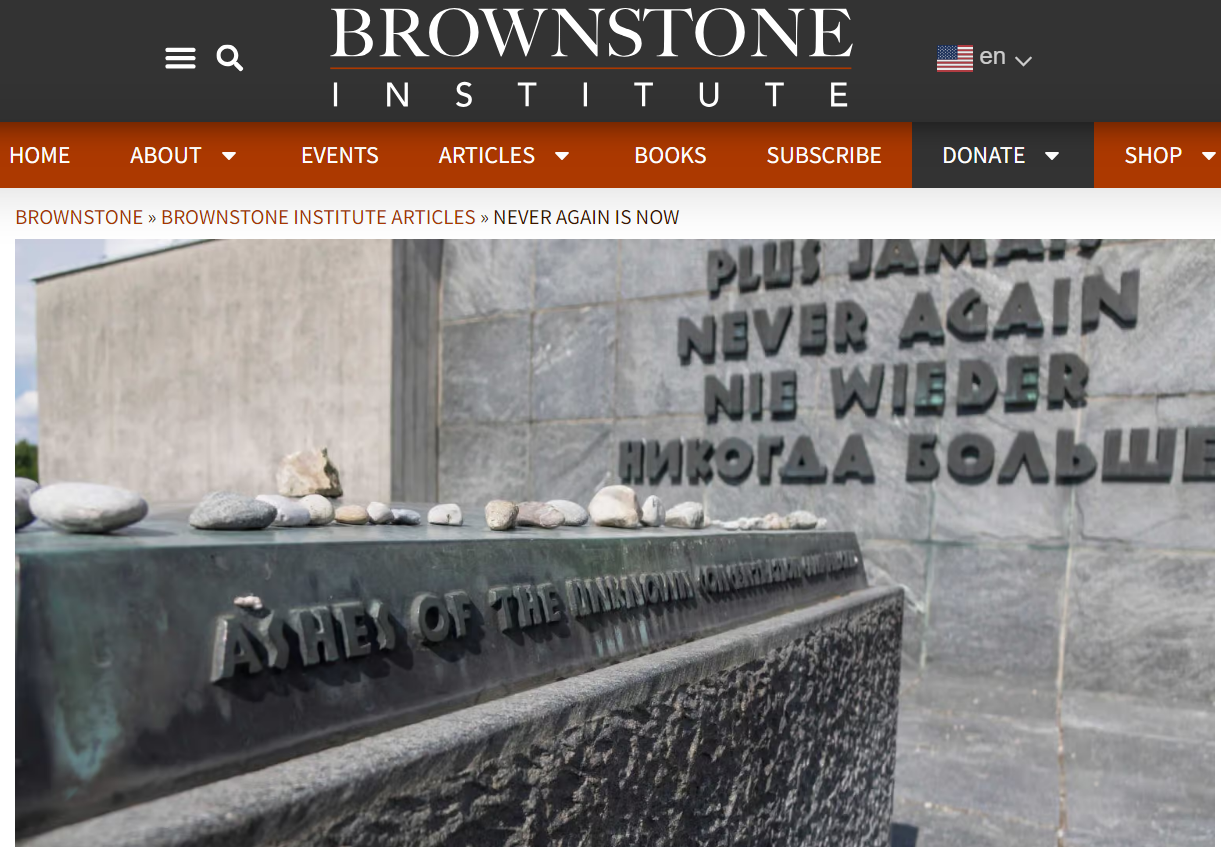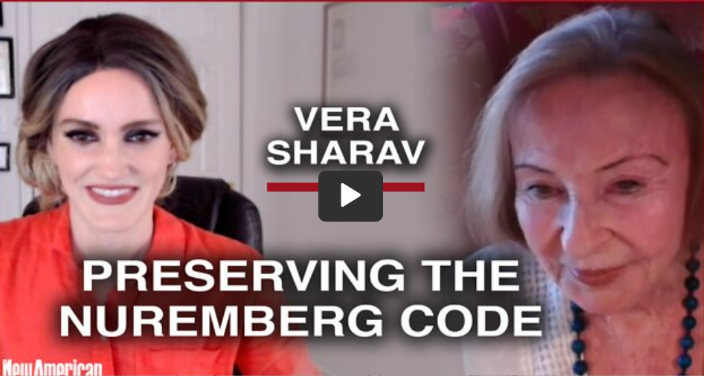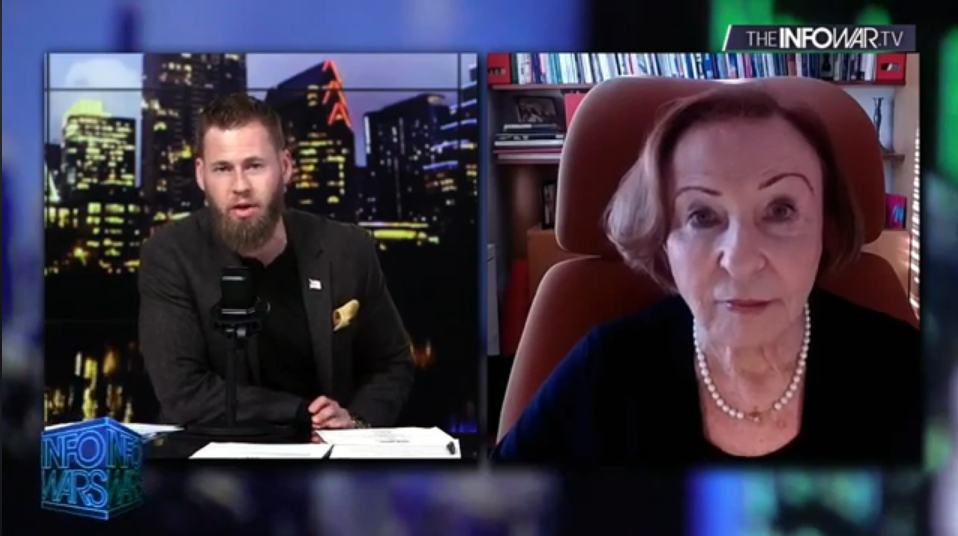Never Again Is Now
Throughout the past three years a number of documentary films have sprouted up, which critically dismantle the adoption and enforcement of harsh global covid policies. But first-time director Vera Sharav’s new five-episode docuseries Never Again Is Now Global is the first film to draw parallels between the 1930’s Nazi era, when government took control of medicine in order to deploy discriminatory health measures, and the restrictive global covid policies enacted since March 2020 under the guise of public health.
This is the first film directed by a Holocaust survivor, Vera Sharav. She partnered with two seasoned producers who have extensive credits in Hollywood documentary production and were introduced to Sharav via a mutual friend in the health freedom world. (The two use aliases in the film’s credits and in this article, appearing as Rose Smith and Robert Blanco, in order to avoid the risk of their high-profile Hollywood projects being defunded.)
“It was December 11, 2021. We innocently went to Vera’s house for a meeting, having no idea what we were getting into,” Smith describes. Blanco continues: “If a Holocaust survivor breaks out the cheese blintzes at 9pm and says, ‘I need help with something,’ how are you going to say no? So we just said, ‘We’re going to do it,’ not knowing the extent or scope of it. At the time there was zip money, zip resources,” he recalls. “When we had our first meeting it was really clear that Robert and Vera had a connection beyond time. They complete each other’s sentences on this topic. They have a synergy that is just so beautiful,” Rose observes.
Together with Sharav they formed a small team to carry the heavy lift of production themselves; with few resources at the outset, the producers retrieved their own camera equipment from storage, transported it to a friend’s apartment and recruited a like-minded cinematographer to film her in an artful interview that comprises part of the film’s narrative spine. The small team also managed the entire post-production process solo. Though Blanco typically hires editors for his projects, he says he couldn’t think of any like-minded colleagues to approach. He explains that even if he had suspected a colleague might lean toward health freedom, he couldn’t confirm it without outing himself. Out of necessity, Blanco decided to dive in as editor himself.
When the producers joined the project, Sharav shared with them a list of potential interviewees primarily in Israel, generated by a friendly source. Smith became the casting director and started cold-calling people. She found that many wanted to talk but then grew afraid and pulled back. The first person they interviewed was Sarah Gross. “It kind of happened organically. Whoever we got seemed to just kind of fall into place,” she says.
Recalling the mood of New York City in December of 2021, the harshest period post-vaccine rollout when discrimination and oppression of unvaccinated people was highly embraced and even fashionable, Smith remembers the emotions that flooded her as she sat offscreen, watching the interviews during recording. “I felt like I was in a World War II basement, like we were trying to talk about something that we can’t talk about in the wider world. We’re all locked down and it was like what can we do… and then Vera came along.”
The film’s tightly conceived 5-part episodic structure belies the challenge of organizing voluminous, far-reaching content that challenges the official historical narrative about World War II and the Holocaust. Unlike other films about the Holocaust which pointedly ignore or whitewash important historical facts, the filmmakers delve deeply to identify major corporations such as IBM that facilitated the genocide via their manufacturing and technical contributions, and that profited from slave labor in the work camps, such as IG Farben.
Each episode opens with a title card highlighting a powerful quote from an interviewee. Rabbi Michoel Green’s statement, “Here we go again on steroids” opens Episode One; Dr. Vladimir Zelenko’s poignant observation, “This time around we’re all Jews” opens Episode Four; “Never Give In, Never Give Up,” is the call to action for the final episode. These pithy quotes orient the viewer to the film’s key messages in each episode: explaining the parallels between the 1930’s and today, detailing the use of fear and propaganda by governments and corporations in lockstep, revealing the continuous thread of powerful families behind eugenics and genocidal agendas historically and today, examining the potential loss of freedom threatening humanity and calling viewers to engage in massive, peaceful resistance.
Notably, in Episode Two, Sharav tells the story of her son’s death, caused by an improperly tested pharmaceutical. “He died of a reaction to a prescribed drug, and that whole horror led me to do the kind of advocacy work that I’ve been doing for decades. And essentially, like many of those psychiatric drugs, they’re put out in… the way the COVID injections, the experimental injections are. They are not tested properly,” Sharav says in the film. She later founded the Alliance for Human Research Protection, whose mission is to ensure that the moral right of voluntary medical decision-making is upheld. The group “works to counter widely disseminated false claims that exaggerate the benefits of medical interventions, while minimizing risks.” (Source: AHRP website)
Blanco initially tried laying out the film as a traditional three-act structure with a scripted narrative and omniscient narrator’s voice.
“When we brought the first cut to Vera, she said, ‘This really isn’t what we want to do. What we really want to do is throw all those facts and figures away and really just focus on what the people are saying and…their personal connection to Holocaust history… really focus in on them and their words. Along the way if we choose the right people they’ll give us what’s important to this history…’ So we said okay, let’s do that. And we really began to create…more of a Shoah style framework where you’re letting the survivors and descendants speak and tell their own personal stories and their observations, having been there or heard their grandparents.”
Sharav explains her deep commitment to allowing ample space for quiet reflection by each of the film subjects. “I prepared no questions. I simply turned on the camera and let each survivor say what they wanted to say without prompting of any kind.”
The film’s narrative structure rests upon interviewee testimonies interspersed with sobering commentary from experts like former Pfizer vice president turned whistleblower Dr. Michael Yeadon, historian and journalist Edwin Black and early covid treatment pioneer Dr. Vladimir Zelenko, to whom the docuseries is dedicated (Dr. Zelenko died in June 2022). The series opens with eyewitness accounts from Sharav and fellow survivors Sarah Gross and Henny Fischler, who both express dismay at how average people fail to see through the lies and tyrannical control thrust upon them by their own governments under the guise of safety and public health. Fischler implores:
Open your eyes, open your ears, not to go like sheep. We went like sheep in the second world war. You didn’t understand anything, you didn’t learn anything from this war? This … is another war. Okay, it’s a biological war but it is a war. Don’t do things without questioning. People are so blind. They don’t understand anything, they don’t learn anything. I want to show people that we are going again into another situation that’s horrible.
Sharav strategically centers the testimonies of survivors along with first- and second-generation offspring both as an artistic choice to craft a compelling story and as a means to help the film withstand knee-jerk attacks expected from mainstream media and co-opted Jewish institutions. Sharav is no stranger to backlash against her fearless efforts to voice concern about the potential for history to repeat itself. (At a protest event in January 2022, Brussels police dismantled the outdoor stage and turned fire hoses on the crowd that had gathered to hear Sharav and other activists speak; and after speaking at the Nuremberg 75th Anniversary event in August 2022, a local newspaper criticized Sharav, questioned her identity as a Jew and survivor and called her instead “a Romanian.”)
Sharav explains the critical decision to include a wide-ranging group of survivors and offspring from different countries, which serves to strengthen the film’s message by diversifying the messengers. When asked what type of potential attacks she expects following the film broadcast, she replies: “How do you go after people who are just speaking their truth? You can’t argue it.”
The filmmakers further strengthen their message by including powerful interviews with Kevin Jenkins and Reverend Aaron Lewis, two Black leaders (Lewis’ grandparents were Jewish) who draw clear parallels between covid vaccine passports and policies deployed against Black Americans to limit and control their movement in society from slavery forward. Reverend Lewis draws on the words of abolitionist Harriet Tubman and applies them to today’s climate:
“She said, ‘I freed thousands of slaves…I could have freed thousands more if only they knew they were slaves.’ That’s a powerful statement because I believe that that’s where we are today. We are in a moment and time where people don’t even know what’s going on. They’re in gross denial. They don’t even connect the dots to one another. They are completely just ignoring the glaring signs of what’s happening in society… the average person today would not understand how much of a direct parallel what we are going through today as what we dealt with back in the thirties and forties. And that’s scary, because if we only paid attention to what happened then we could avert what’s happening now.
Despite tackling arguments head-on that mainstream media and political bodies currently construe as highly controversial, the film’s overarching artistic style is one of quiet consideration, even showing a slight sense of restraint. The film offers no strident lectures, no heavy-handed attempts to convince the viewer of a particular conclusion, no pummeling us with data sets or charts and graphs. Instead, the matter-of-fact tone combined with the understated look of the live action footage – except for Sharav’s beautifully lit and framed interview, all other subjects were filmed over Zoom due to pragmatic time and budget constraints – – work together as foils to underscore several strengths of the filmmaking: the strong deployment of historical imagery and facts, the undeniable emotional weight carried by “everyman” eyewitness testimonies, and the richly detailed and nuanced intellectual analyses from well-known doctors, scientists and academics including Dr. Zelenko, Dr. Yeadon, Edwin Black and Uwe Alschnew, woven throughout.
The film’s calm, measured approach and the reflective mood created as each interviewee simply speaks their truth aloud work as critical counterpoints to the use of graphic historical footage that shows the violence and brutality of ghettos, war and extermination camps. A louder narrative would have left viewers crushed by both images and sound, but Sharav and her partners deftly sidestep that potential trap. (A warning does appear at the opening of each episode noting the graphic nature of the footage contained within.) The film adopts an unhurried, even pace, one which the filmmakers intentionally allowed each interviewee to set via the rhythm of their spoken words. (This rhythm is influenced by the fact that English is a second language for many of the interviewees.) Sharav’s instinct to insist that the film’s style and structure be driven by the oral testimonies of the subjects proves successful.
At the core of the film, subjects are either Holocaust survivors themselves or first- and second-generation offspring who share the lessons they learned from listening closely to their grandparents’ stories. Throughout the subjects’ stories, illustrated by mountains of diligently sourced b-roll —Blanco spent countless late nights sourcing the over 900 clips used throughout the five episodes to carefully illustrate the stories of interviewees, digging to find as close a match as he could in terms of clips’ historical dates and geographic locations — the visual images manage to remain clean and uncluttered to the eye. In an age when certain elements of documentary production seek to mimic YouTube culture with increasingly fast-paced narratives, quick cuts and obligatory drone footage, Never Again Is Now Global quietly conveys its powerful message through understated means and the simple deep focus of allowing each interviewee to tell their story uninterrupted and unrushed.
The film’s score benefits from Blanco’s access to a large music library license through Children’s Health Defense, a producing entity on the project. His concept was to select a unique melody for each speaker, a signature piece of music which follows them throughout the film. “When people are driving lots of facts and figures it’s more of a mystery type of tune and when people are more emotional we use cello and viola,” Blanco explains.
German musician and singer Karsten Troyke not only wanted to be interviewed in the film but also offered his music for the score. Sharav asked Karsten to record new versions of two songs, one instrumental and one with words, that play under the credits. Sharav also sourced the music of Jewish European composer Marcel Tyberg, who was killed in Auschwitz. His composition plays underneath the last survivor’s interview.





